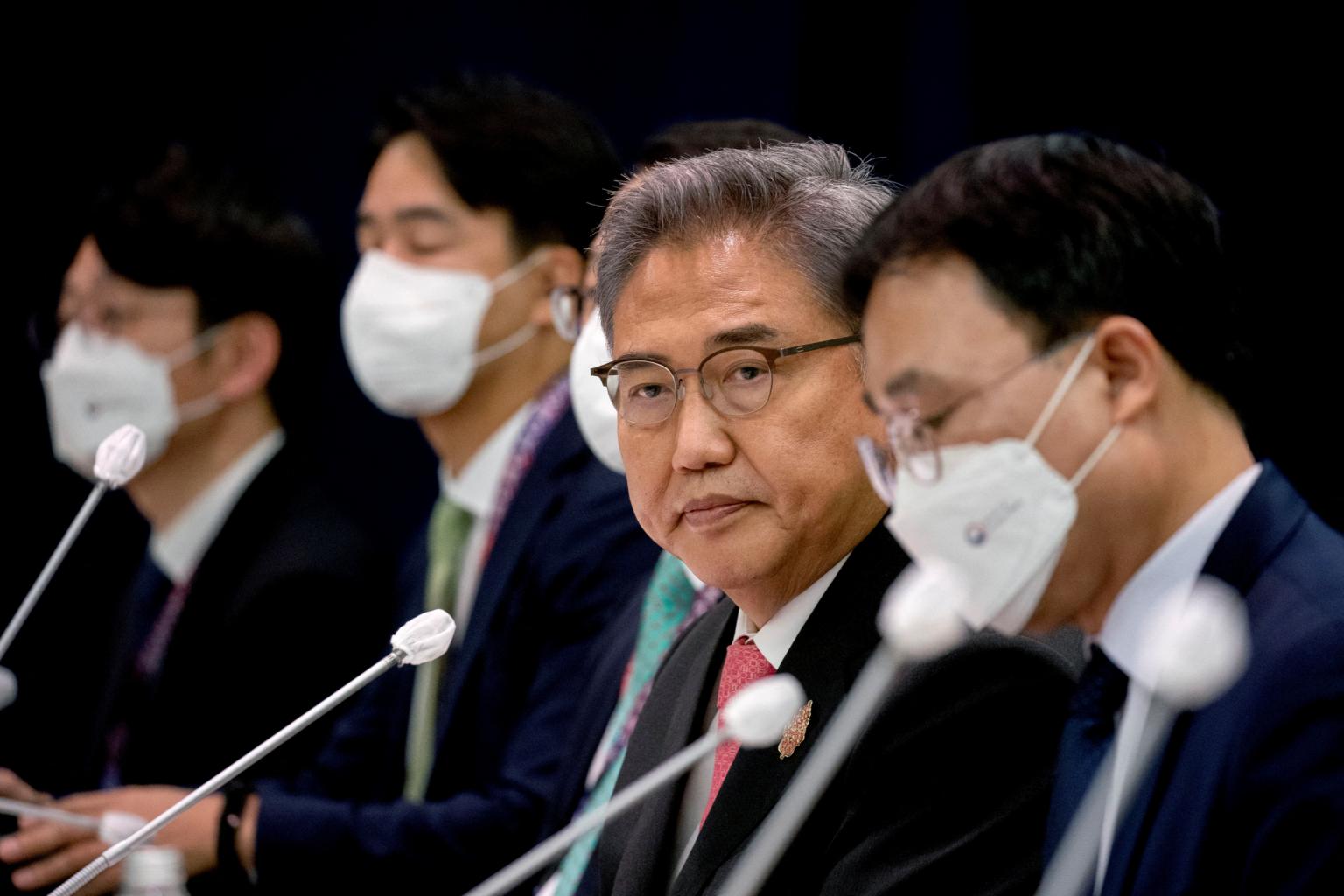South Korea seeks to kickstart talks to resolve historical feuds with Japan
Sign up now: Get ST's newsletters delivered to your inbox

South Korean Foreign Minister Park Jin attends a meeting with the US and Japan at a G-20 meeting in Bali on July 8, 2022.
PHOTO: REUTERS
Follow topic:
SEOUL (REUTERS) - South Korea hopes a high-level visit to Tokyo next week will kickstart talks aimed at a breakthrough in historical disputes despite concerns the death of former Japanese premier Shinzo Abe could disrupt efforts to mend ties, Seoul officials said.
Relations between the two North Asian US allies have been strained over disputes dating to Japan's 1910-1945 occupation of Korea.
Washington has been pressing for Tokyo and Seoul to mend fences in the face of the North Korean nuclear threat and the rising influence of China.
Officials with the administration of new South Korean President Yoon Suk-yeol, who took office in May vowing to improve ties with Japan, told Reuters they feel emboldened by Japanese Prime Minister Fumio Kishida's recent election victory which could give him more scope to advance his policy agenda for another three years.
Foreign Minister Park Jin will visit Tokyo as early as next week, a trip which a senior official handling Japan policy said is aimed at "turning on the tap" for serious negotiations on issues relating to forced labour, which stalled under Mr Yoon's predecessor.
Mr Park will visit Tokyo on July 18, Japan's public broadcaster NHK reported on Thursday. South Korea did not immediately confirm the report.
Another official said Mr Yoon would send a high-level delegation led by the prime minister when Japan holds public memorial service for Mr Abe, who was shot and killed last week while on the campaign trail.
Mr Yoon would also likely use his Aug 15 Liberation Day speech marking Korea's independence from Japan as a chance to send a reconciliatory message to Tokyo, the official added.
"What we're trying to do is to open the door for real talks," the senior official said.
The assassination of Mr Abe, who was a defining leader in Japanese politics and a divisive figure in Korea, has raised new doubts about the outlooks for relations with South Korea, where bitter wartime memories run deep.
Some analysts say South Korea might be put on the back burner while Mr Kishida presses to achieve Mr Abe's unrealised dreams, including constitutional reform aimed at allowing Japanese troops to fight overseas.
But some South Korean officials see Japan is more willing to talk now, with pressure by US President Joe Biden's administration also playing a potential role.
"We see great potential in stronger trilateral relationships," Mr Derek Chollet, Counsellor of the US State Department, told Reuters this week.
Japan’s Chief Cabinet Secretary Hirokazu Matsuno said on Friday that cooperation with Seoul and Washington is "inevitable" for responding to North Korea’s threat and other regional issues.
"Although relations between Japan and South Korea are in a very severe state... we don’t think it can be left as it is," he told a news conference, adding Tokyo would work together to resolve history issues and restore ties.
Mr Yoon and Mr Kishida met with Mr Biden on the sidelines of the recent Nato summit for their first trilateral talks, and Mr Chollet said Washington stands ready to facilitate strong ties between its two allies.
At home, the Yoon government is gathering opinions from victims of forced labour, lawyers and experts via a newly launched public-private panel, which held its second hearing on Thursday.
At stake is South Korean court orders for a seizure of assets of Japanese companies accused of not compensating some of their colonial-era labourers. Tokyo has warned of serious repercussions if the orders are enforced.
The first official said the Yoon administration was seeking a "realistic, feasible proposal" that can win consent from both victims and the Japanese government.
A third official was more cautious, saying the compensation issue should be resolved alongside trade and other rows, which could make a compromise more difficult.
Ms Yuko Nakano, a fellow at the US-based Centre for Strategic and International Studies, said any compromise would require patience and commitment from both Mr Yoon and Mr Kishida.
"High-level visits and meetings often attract attention, but equally important is to continue building on efforts that are happening below the surface," she said.

